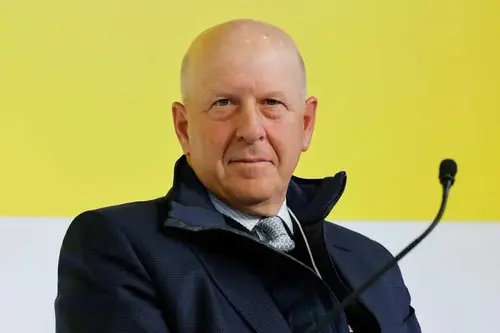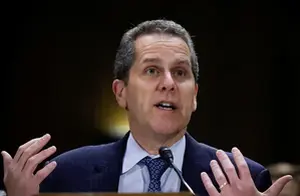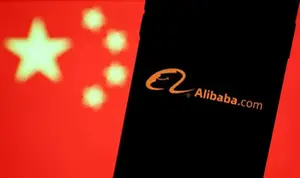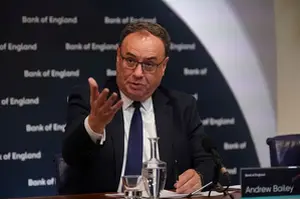
Why Goldman’s consumer ambitions failed, and what it means for CEO David Solomon
When David Solomon was chosen to succeed Lloyd Blankfein as Goldman Sachs CEO in early 2018, a spasm of fear ran through the bankers working on a modest enterprise known as Marcus.
The man who lost out to Solomon, Harvey Schwartz, was one of several original backers of the firm's foray into consumer banking and was often seen pacing the floor in Goldman's New York headquarters where it was being built. Would Solomon kill the nascent project?
The executives were elated when Solomon soon embraced the business.
Their relief was short-lived, however. That's because many of the decisions Solomon made over the next four years — along with aspects of the firm's hard-charging, ego-driven culture — ultimately led to the collapse of Goldman's consumer ambitions, according to a dozen people with knowledge of the matter.
The idea behind Marcus — the transformation of a Wall Street powerhouse into a Main Street player that could take on giants like Jamie Dimon's JPMorgan Chase — captivated the financial world from the start. Within three years of its 2016 launch, Marcus — a nod to the first name of Goldman's founder— attracted $50 billion in valuable deposits, a growing lending business and had emerged victorious from intense competition among banks to issue a credit card to Apple's many iPhone users.
Solomon at risk?
But as Marcus morphed from a side project to a focal point for investors hungry for a growth story, the business rapidly expanded and ultimately buckled under the weight of Solomon's ambitions. Late last year, Solomon capitulated to demands to rein in the business, splitting it apart in a reorganization, killing its inaugural loan product and shelving an expensive checking account.
The episode comes at a sensitive time for Solomon. More than four years into his tenure, the CEO faces pressure from an unlikely source — disaffected partners of his own company, whose leaks to the press in the past year accelerated the bank's strategy pivot and revealed simmering disdain for his high-profile DJ hobby.
Goldman shares have outperformed bank stock indexes during Solomon's tenure, helped by the strong performance of its core trading and investment banking operations. But investors aren't rewarding Solomon with a higher multiple on his earnings, while nemesis Morgan Stanley has opened up a wider lead in recent years, with a price to tangible book value ratio roughly double that of Goldman.
That adds to the stakes for Solomon's second-ever investor day conference Tuesday, during which the CEO will provide details on his latest plan to build durable sources of revenue growth. Investors want an explanation of what went wrong at Marcus, which was touted at Goldman's previous investor day in 2020, and evidence that management has learned lessons from the costly episode.
Origin story
"We've made a lot of progress, been flexible when needed, and we're looking forward to updating our investors on that progress and the path ahead," Goldman communications chief Tony Fratto said in a statement. "It's clear that many innovations since our last investor day are paying off across our businesses and generating returns for shareholders."
The architects of Marcus couldn't have predicted its journey when the idea was birthed offsite in 2014 at the vacation home of then-Goldman president Gary Cohn. While Goldman is a leader in advising corporations, heads of state and the ultrawealthy, it didn't have a presence in retail banking.
They gave it a distinct brand, in part to distance it from negative perceptions of Goldman after the 2008 crisis, but also because it would allow them to spin off the business as a standalone fintech player if they wanted to, according to people with knowledge of the matter.
"Like a lot of things that Goldman starts, it began not as some grand vision, but more like, `Here's a way we can make some money," one of the people said.
Ironically, Cohn himself was against the retail push and told the bank's board that he didn't think it would succeed, according to people with knowledge of the matter. In that way, Cohn, who left in 2017 to join the Trump administration, was emblematic of many of the company's old guard who believed that consumer finance simply wasn't in Goldman's DNA.
Cohn declined to comment.
Paradise lost
Once Solomon took over in 2018, he began a series of corporate reorganizations that would influence the path of the embryonic business.
From its early days, Marcus, run by ex-Discover executive Harit Talwar and Goldman veteran Omer Ismail, had been purposefully sheltered from the rest of the company. Talwar was fond of telling reporters that Marcus had the advantages of being a nimble startup within a 150-year old investment bank.
The first of Solomon's reorganizations came early in his tenure, when he folded it into the firm's investment management division. Ismail and others had argued against the move to Solomon, feeling that it would hinder the business.
Solomon's rationale was that all of Goldman's businesses catering to individuals should be in the same division, even if most Marcus customers had only a few thousand dollars in loans or savings, while the average private wealth client had $50 million in investments.
In the process, the Marcus leaders lost some of their ability to call their own shots on engineering, marketing and personnel matters, in part because of senior hires made by Solomon. Marcus engineering resources were pulled in different directions, including into a project to consolidate its technology stack with that of the broader firm, a step that Ismail and Talwar disagreed with.
"Marcus became a shiny object," said one source. "At Goldman, everyone wants to leave their mark on the new shiny thing."
'Who the f—k agreed to this?'
Besides the deposits business, which has attracted $100 billion so far and essentially prints money for the company, the biggest consumer success has been its rollout of the Apple Card.
What is less well-known is that Goldman won the Apple account in part because it agreed to terms that other, established card issuers wouldn't. After a veteran of the credit-card industry named Scott Young joined Goldman in 2017, he was flabbergasted at one-sided elements of the Apple deal, according to people with knowledge of the matter.
"Who the f---k agreed to this?" Young exclaimed in a meeting shortly after learning of the details of the deal, according to a person present.
Some of the customer servicing aspects of the deal ultimately added to Goldman's unexpectedly high costs for the Apple partnership, the people said. Goldman executives were eager to seal the deal with the tech giant, which happened before Solomon became CEO, they added.
Young declined to comment about the outburst.
The rapid growth of the card, which was launched in 2019, is one reason the consumer division saw mounting financial losses. Heading into an economic downturn, Goldman had to set aside reserves for future losses, even if they don't happen. The card ramp-up also brought regulatory scrutiny on the way it dealt with customer chargebacks, CNBC reported last year.
Pushing back against the boss
Beneath the smooth veneer of the bank's fintech products, which were gaining traction at the time, there were growing tensions: Disagreements with Solomon over products, acquisitions and branding, said the people, who declined to be identified speaking about internal Goldman matters.
Ismail, who was well-regarded internally and had the ability to push back against Solomon, lost some battles and held the line on others. For instance, Marcus officials had to entertain potential sponsorships with Rihanna, Reese Witherspoon and other celebrities, as well as study whether the Goldman brand should replace that of Marcus.
The CEO was said to be enamored of the rise of fast-growing digital players like Chime and believed that Goldman needed to offer a checking account, while Marcus leaders didn't believe the bank had advantages there and should continue as a more focused player.
One of the final straws for Ismail came when Solomon, in his second reorganization, made his strategy chief Stephanie Cohen co-head of the consumer and wealth division in September 2020. Cohen, who is known as a tireless executive, would be even more hands-on than her predecessor Eric Lane, and Ismail felt that he deserved the promotion.
Within months, Ismail left Goldman, sending shock waves through the consumer division and deeply angering Solomon. Ismail and Talwar declined to comment for this article.
Boom & bust
Ismail's exit ushered in a new, ultimately disastrous era for Marcus, a dysfunctional period that included a steep ramp-up in hiring and expenses, blown product deadlines and waves of talent departures.
Now run by two former tech executives with scant retail experience, ex-Uber executive Peeyush Nahar and Swati Bhatia of payments giant Stripe, Marcus was, ironically, also cursed by Goldman's success on Wall Street in 2021.
The pandemic-fueled boom in public listings, mergers and other deals meant that Goldman was en route to a banner year for investment banking, its most profitable ever. Goldman should plow some of those volatile earnings into more durable consumer banking revenues, the thinking went.
"People at the firm including David Solomon were like, `Go, go go!'" said a person with knowledge of the period. "We have all these excess profits, you go create recurring revenues."
'Only the beginning'
In April of 2022, the bank widened testing of its checking account to employees, telling staff that it was "only the beginning of what we hope will soon become the primary checking account for tens of millions of customers."
But as 2022 ground on, it became clear that Goldman was facing a very different environment. The Federal Reserve ended a decade-plus era of cheap money by raising interest rates, casting a pall over capital markets. Among the six biggest American banks, Goldman Sachs was most hurt by the declines, and suddenly Solomon was pushing to cut expenses at Marcus and elsewhere.
Amid leaks that Marcus was hemorrhaging money, Solomon finally decided to pull back sharply on the effort that he had once championed to investors and the media. His checking account would be repurposed for wealth management clients, which would save money on marketing costs.
Now it is Ismail, who had joined a fintech called One that was backed by Walmart in early 2021, who will be taking on the banking world with a direct-to-consumer digital startup. His former employer Goldman would largely content itself with being a behind-the-scenes player, providing its technology and balance sheet to established brands.
For a company with as much self-regard as Goldman, it would mark a sharp comedown from the vision held by Solomon only months earlier.
"David would say, `We're building the business for the next 50 years, not for today,'" said one former Goldman insider. "He should've listened to his own soundbite."






